七年级下册英语Unit12知识点总结
七年级英语下册重点短语:Unit12

Unit 12 Don’t eat in class. ⼀、词组 school rules 学校规章制度 break the rules 违反规章制度 in the hallways 在过道 listen to music 听⾳乐 in the music room 在⾳乐教室⾥ in the dining hall 在餐厅 sports shoes 运动鞋 gym class 体育课 after school 放学后 have to do 不得不做 too many 太多 get up 起床 by ten o’clock ⼗点之前 make dinner 做饭 the children’s palace 少年宫 ⼆、句型 (1)—Don’t arrive late for class. (2)—We can’t listen to music in the hallways,but we can listen to it outside. (3)—What else do you have to do? -- We have to clean the classroom. (4)--Can we wear hats in school? --Yes,we can/ No,we can’t. (5)-Do you have to wear a uniform at school? -Yes,we do /No,we don’t. 重难点精析 祈使句 通常⽤来表⽰命令、请求、禁⽌、建议、警告等语⽓。
它的主语you(听话⼈)通常省略。
其构成通常有以下⼏种形式。
1)Be型(即系动词原型be+表语+其他)。
如:Be quiet,please. 否定句Don’t + be+表语+其他。
如:Don’t be angry. 2)Do型(即系动词原形+宾语+其他)。
如: Open you books,please. 否定句Don’t +实义动词原形+宾语+其他。
七年级下册英语unit-12单元全册知识点归纳与复习总结说课讲解
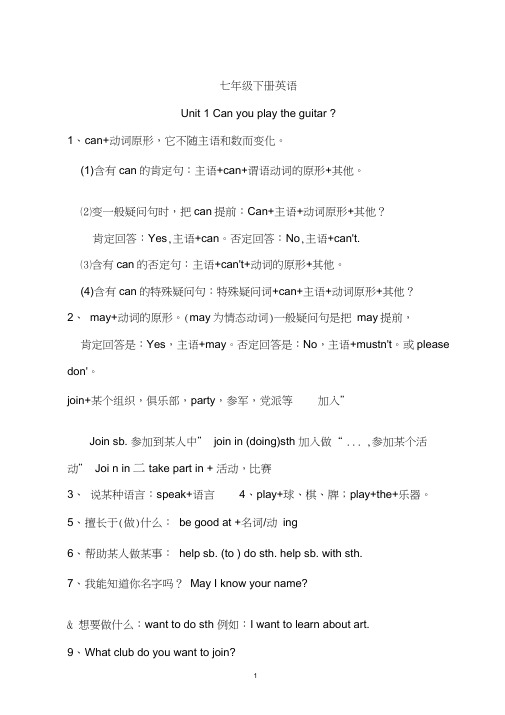
七年级下册英语Unit 1 Can you play the guitar ?1、c an+动词原形,它不随主语和数而变化。
(1)含有can的肯定句:主语+can+谓语动词的原形+其他。
⑵变一般疑问句时,把can提前:Can+主语+动词原形+其他?肯定回答:Yes,主语+can。
否定回答:No,主语+can't.⑶含有can的否定句:主语+can't+动词的原形+其他。
(4)含有can的特殊疑问句:特殊疑问词+can+主语+动词原形+其他?2、may+动词的原形。
(may为情态动词)一般疑问句是把may提前,肯定回答是:Yes,主语+may。
否定回答是:No,主语+mustn't。
或please don'。
join+某个组织,俱乐部,party,参军,党派等加入”Join sb. 参加到某人中” join in (doing)sth 加入做“... ,参加某个活动” Joi n in二 take part in + 活动,比赛3、说某种语言:speak+语言4、play+球、棋、牌;play+the+乐器。
5、擅长于(做)什么:be good at +名词/动ing6、帮助某人做某事:help sb. (to ) do sth. help sb. with sth.7、我能知道你名字吗?May I know your name?& 想要做什么:want to do sth 例如:I want to learn about art.9、W hat club do you want to join?I want to join the chess club and the basketball club.10、What club does Tom want to join? He wants to join the swimming club .11、He can't play the violin or the piano. Can you help kids with swimming?12、Why do you want to join the English club? Because I want to learn English well.Unit 2 What time do you go to school ?1、what time和when引导的特殊疑问句。
人教版七年级英语下册单元知识归纳Unit12.doc
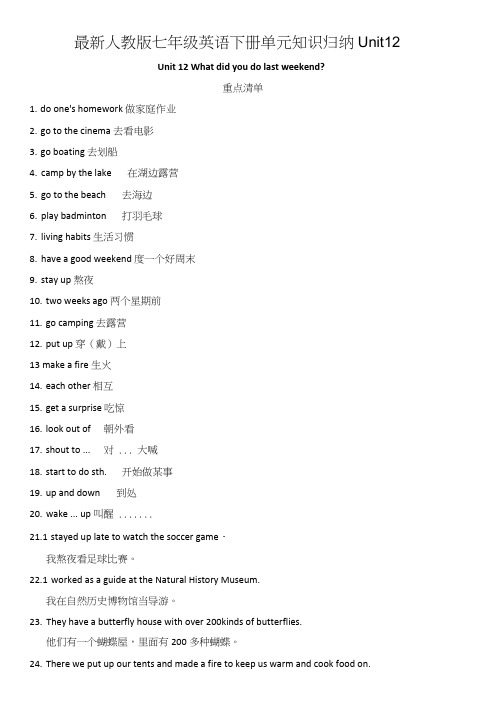
最新人教版七年级英语下册单元知识归纳Unit12Unit 12 What did you do last weekend?重点清单1.do one's homework 做家庭作业2.go to the cinema 去看电影3.go boating 去划船4.camp by the lake 在湖边露营5.go to the beach 去海边6.play badminton 打羽毛球7.living habits 生活习惯8.have a good weekend 度一个好周末9.stay up 熬夜10.two weeks ago 两个星期前11.go camping 去露营12.put up 穿(戴)上13 make a fire 生火14.each other 相互15.get a surprise 吃惊16.look out of 朝外看17.shout to ... 对 ... 大喊18.start to do sth. 开始做某事19.up and down 到处20.wake ... up 叫醒 .......21.1stayed up late to watch the soccer game・我熬夜看足球比赛。
22.1worked as a guide at the Natural History Museum.我在自然历史博物馆当导游。
23.They have a butterfly house with over 200kinds of butterflies.他们有一个蝴蝶屋,里面有200多种蝴蝶。
24.There we put up our tents and made a fire to keep us warm and cook food on.在那我们支起一个帐篷,并生火取暖,在火上烹饪食物。
25.1was so tired that I went to sleep early.我太累了,因此很早就去睡觉了。
人教版七年级英语下册-Unit 12:知识点复习总结+单元测试(word版,无答案)

Unit12 What did you do last weekend?【重点单词】camp v.扎营;扎帐篷lake n.湖,湖泊beach n.海滩,沙滩badminton n.羽毛球运动sheep n.羊,绵羊as adv.&pron.作为,当做natural pron.自然的butterfly n.蝴蝶visitor n.游客;访问者tired adj.疲倦的stay v.停留stay up late深夜不留away adv.离开run away 跑开mouse n.老鼠baby n.幼小的shout v.呼叫,喊叫shout at…冲……大声叫嚷woof v.(狗叫声)汪汪language n.语言fiy v.飞kite n.风筝fiy a kite 放风筝high adj.&adv高的(地)high school中学ago adv.以前India n.印度tent n.帐篷put up 搭起,举起moon n.月亮surprise n.&v.惊奇,惊讶get a surpris 吃惊snake n.蛇scared adj.惊慌的move v.移动shout to… 对……大声喊叫start v.开始,着手jump v.跳跃up and down 上上下下wake v.弄醒,醒into prep.到……里面forest n.森林ear n.耳朵【重点短语】1. last weekend 上周末2. do one’s homework 做作业3. go to the cinema 看电影4. go boating 去划船5. camp by the lake 在湖边露营6. go to the beach 去海滩7. play badminton 打羽毛球8. on Saturday morning 在周六的早上9. study for the English test 为了英语考试学习10. feed some cows 喂一些奶牛11. work as a guide 做为一个导游工作12. Natural History Museum 自然历史博物馆13. butterfly house 蝴蝶馆14. over 200 kinds of butterflies 超过200多种蝴蝶15. tell sb about … 告诉某人关于…16. living habits 生活习惯17. be kind of tired 有点儿累19. stay up 熬夜20. play with sb. 和某人玩21. lose things 丢东西22. run away 跑开23. fly a kite 放风筝24.as a special gift 作为一个特殊的礼物25. take sb. to sp. 把某人带到某地26. go camping 去露营27. put up the tents 搭建帐篷28. make a fire 生火29. keep sb. warm 使某人保持温暖30. on the first night 在第一天晚上31.so...that... 如此…以至于…32. go to sleep 去睡觉33. get a surprise 吃惊34. see sb. doing sth. 看见某人正在做某事35. jump up and down 上蹦下跳36. climb onto one’s back 爬到某人背上37. shout at/shout to 大声喊叫38 wake …up 把...弄醒39. move into… 移入,爬进…中40. a useful lesson 有用的一课【重点句型】1.—What did you do last weekend?Lucy?Lucy,你上周末做了什么?—Well, on Saturday, I played badminton.噢.周六我打羽毛球了。
七年级下册英语unit 12 what did you do last weekend 知识点总结(单词,短语,句型,语法)

Unit 12 What did you do last weekend?【短语归纳】1.do my homework 做作业2.go to the cinema 去看电影3.go boating 去划船4.by the lake 在湖边5.go to the beach 去海滩6.play badminton 打羽毛球7.visit my grandma 看望我奶奶8.study for the English test 为英语测验而学习备考9.the Natural History Museum 自然历史博物馆10. kind of 有点儿11.stay up 深夜不睡,熬夜12. give back 归还13.be afraid 害怕14. play the guitar 弹吉他15.go to the library 去图书馆16. in a swimming pool 在游泳池里17. shout at… 冲……大声叫嚷18. high school 高中,中学19.fly kites 放风筝、20. go camping 去野营21.put up 搭建22 .make a fire 生火23.tell stories 讲故事24 .each other 互相25.go to sleep 入睡26.get a surprise 吃惊27.shout to… 呼喊……喊叫…… 28.up and down 来来回回;上上下下29.wake…up 把……弄醒30.do my homework 做我的家庭作业31.on Saturday morning 在星期六早上32.have a good weekend 周末过得愉快33.the next morning 第二天早上34.work as 以……身份而工作35.run away 跑开36.move into … 移进……【用法集萃】1. go + doing 去做某事2. play + 球类玩……球3. 时间段+ ago ……前4. keep + sb. / sth. + 形容词/ 副词/ 介词短语使……保持……5. so + 形容词/ 副词+ that 句子如此……以至于……6. see sb. doing sth. 看见某人正在做某事7. let sb. do sth. 让某人做某事8. start to do / doing sth. 开始做某事【经典范文】I had a busy weekend. On Saturday morning, I did my homework, and then I played computer games. In the afternoon, I visited my grandmother. We talked for a long time.On Sunday morning, I cleaned my room and did some reading. Then I cooked for m parents. In the afternoon, I watched a football match on TV and listened to music. I had a good time.知识点解析1. 表示““过去”的时间。
人教版七年级下册英语Unit12单元语法知识点总结

人教版七年级下册英语Unit12单元语法知识点总结本单元重点短语的具体用法1. Last weekend:用于描述过去的时间,通常在句子中作时间状语。
例如:I went shopping last weekend.(我上周末去购物了。
)2. Do one's homework:表示做作业。
例如:I need to do my homework before going out.(我需要在出去之前做作业。
)3. Go to the cinema:去看电影。
例如:They decided to go to the cinema instead of staying at home.(他们决定去电影院而不是待在家里。
)4. Go boating:去划船。
例如:We went boating on the lake and had a great time.(我们在湖上划船,玩得很开心。
)5. Camp by the lake:在湖边露营。
例如:They camped by the lake and enjoyed the beautiful scenery.(他们在湖边露营,欣赏美丽的风景。
)6. Go to the beach:去海滩。
例如:I like to go to the beach to relax.(我喜欢去海滩放松。
)7. Play badminton:打羽毛球。
例如:They played badminton in the park.(他们在公园里打羽毛球。
)8. On Saturday morning:在周六的早上。
例如:On Saturday morning, I usually sleep in.(在周六的早上,我通常会睡懒觉。
)9. Study for the English test:为英语考试学习。
例如:I have to study for the English test tomorrow.(我必须为明天的英语考试学习。
Unit12单元知识点归纳总结人教版七年级英语下册

Unit 12 知识归纳重点短语go boating 去划船go to the beach 去海滩go camping 去野营shout at ... (尤指生气时)冲……大声叫嚷shout to ... (提高音量)对……大声喊stay up late 深夜不睡;熬夜put up tents 搭起帐篷fly a kite 放风筝make a fire 生火get a surprise 吃惊the next morning 第二天早上take a long bus ride 乘长途公共汽车look out of ... 向……外看learn a second language 学习第二语言learn a useful lesson 学到有用的一课camp by the lake 在湖边露营play badminton 打羽毛球work as a guide 担任导游工作run away 跑开jump up and down 上下来回地跳;跳来跳去wake ... up 把……弄醒move into ... 移进 / 搬进……living habits 生活习惯so +adj./adv. +that 句子如此……以至于……start to so sth.= start doing sth. 开始做某事be scared of ... 害怕...... be scared to do sth. 害怕做某事语法知识感叹句感叹句:表示赞美、惊叹、喜悦等感情的句子,句末用感叹号。
由“what”和“how”引导(1)what引导的感叹句①What + a / an +adj.+单数可数名词(+主语+谓语)!What a useful book (it is)!②What +adj.+复数可数名词(+主语+谓语)!What beautiful mountains (they are)!What +adj.+不可数名词(+主语+谓语)!(注意此结构与how感叹句的转换)What great weather (it is)(2)how引导的感叹句①How +adj.+ a / an +单数可数名词(+主语+谓语)!How useful a book (it is)!②How+adj./adv.(+主语+谓语)!How great (the weather is)!How well (he sings)!③How+主语+谓语!(How+句子)(了解即可)How time flies! 时光飞逝!How I miss you! 我多想念你呀!。
人教版七年级下册英语Unit12What-did-you-do-last-weekend?知识点总结

七下Unit 12 What did you do last weekend?一、Important Phrases:1.go to the cinema 去影院★=go to the movies2.go boating/camping 去划船/野营★summer camp 夏令营3.camp by the lake 在湖边野营★by the pool在池边4.go to the beach 去海滩★on the beach 在沙滩上5.play badminton 打羽毛球play+球类/棋类名词(不加冠词)6. study for the test 备考★test=exam7.feed some sheep/cows喂羊/牛★feed(fed)on...以..为食,feed with...用...喂养8. work as a guide 做导游工作★work as +职业从事某工作9. at the Natural History Museum 自然历史博物馆★nature(n.不可数)大自然-natural(adj.)自然的10. over 200 kinds of butterflies 200多种蝴蝶★over=more than 超过11.living habits 生活习惯★make a living 谋生;eating habits饮食习惯12.kind of tired 有点累★kind of = a little13. stay up late 熬夜★stay at home 待在家,stay away from 远离,lately(adv.)最近地14.sleep early 早睡★sleepy 困的,asleep睡着的15.a family of mice 老鼠一家★mouse(单)-mice(复)16.be afraid of sth./to do 害怕★afraid=scared17.run away 跑开★take away 带走,put...away 把某物收拾好,give away 捐赠18. climb onto one’s back 爬上某人的背19. shout at/to sb.冲某人大叫★shout out 大喊出20. a second language 第二语言★mother tongue 母语21.fly a kite放风筝22.do something interesting 做有趣的事★修饰不定代词,adj.后置:anything special23.finish high school 中学毕业★finish doing sth 完成做某事24.a special gift一特殊礼物★gift=present25.take us to India 带我们去印度26.take a long bus ride 坐很久的公交车27.put up our tents 搭帐篷★put up:搭建,举起,张贴28.make a fire生火29.cook food on the fire 在火上做饭★on an open fire 明火,篝火30.tell cach other stories 互相讲故事★tell a lie 说谎,tell a joke 讲笑话31.keep sb.warm 使某人保持暖和32.sit under the moon 坐在月光下★moonlight月光,moon cake月饼33.so.......that.......如此...以致于...34.get a surprise 吃惊35. look out of...向外看★look out 小心,look for寻找,look after 照顾36. jump up and down 跳上跳下37. move into the forest 进入森林38. wake sb up叫醒某人★wake up醒来,awake醒着的39. read a book about history 读一本历史书★read...to sb给某人读...40.see an interesting talk show 看有趣的脱口秀二、Key Language Points:1.Where did you go last weekend? What did you do last weekend?上周末你去了哪里?上周末你做了什么?一般过去时的特殊疑问句:1)特殊疑问词+did+主语+v.(原)+其他?如疑问词作主语,则陈述语序,如:Who bought you this new dress?谁给你买的新裙子?2)特殊疑问词+was/were+主语+其他?Where were you last night?昨晚你在哪里?2.----Who visited her grandma? -----Becky did.为避免重复,常用do,does,did,so等代替前文提到的内容。
Unit12知识归纳人教版七年级英语下册
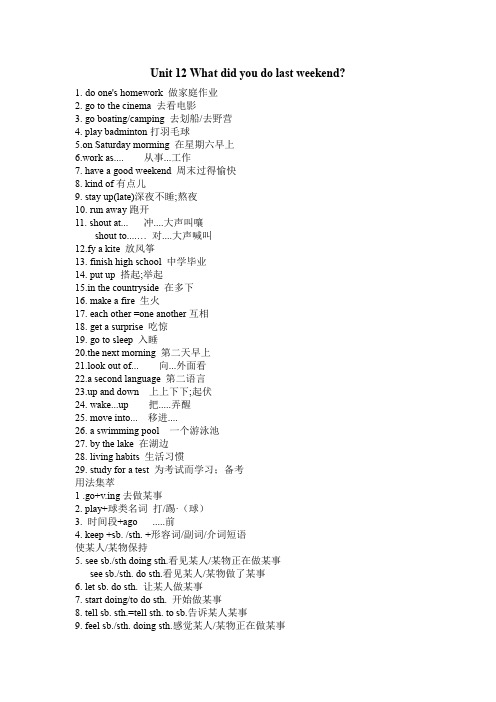
Unit 12 What did you do last weekend?1.do one's homework 做家庭作业2. go to the cinema 去看电影3. go boating/camping 去划船/去野营4. play badminton打羽毛球5.on Saturday morming 在星期六早上6.work as.... 从事...工作7. have a good weekend 周末过得愉快8. kind of有点儿9. stay up(late)深夜不睡;熬夜10. run away跑开11. shout at... 冲....大声叫嚷shout to....… 对....大声喊叫12.fy a kite 放风筝13. finish high school 中学毕业14. put up 搭起;举起15.in the countryside 在多下16. make a fire 生火17. each other =one another互相18. get a surprise 吃惊19. go to sleep 入睡20.the next morning 第二天早上21.look out of... 向...外面看22.a second language 第二语言23.up and down 上上下下;起伏24. wake...up 把.....弄醒25. move into... 移进....26. a swimming pool 一个游泳池27. by the lake 在湖边28. living habits 生活习惯29. study for a test 为考试而学习;备考用法集萃1 .go+v.ing去做某事2. play+球类名词打/踢·(球)3. 时间段+ago .....前4. keep +sb. /sth. +形容词/副词/介词短语使某人/某物保持5.see sb./sth doing sth.看见某人/某物正在做某事see sb./sth. do sth.看见某人/某物做了某事6. let sb. do sth. 让某人做某事7. start doing/to do sth. 开始做某事8. tell sb. sth.=tell sth. to sb.告诉某人某事9. feel sb./sth. doing sth.感觉某人/某物正在做某事feel sb./sth. do sth.感觉某人/某物做了某事10. so+形容词/副词+that.....如此......以至于......11.感叹句①How+ adj./adv.(+主语+谓语+其他)!① What(+ a/an)+ adj. +名词(+主语+谓语+其他)!作文范文:A Busy WeekendI had a busy weekend last week. I spent lots of time doing my homework on Saturday morning. Then I cooked lunch. After lunch, I went shopping and bought lots of food and drinks because it was my birthday the next day. In the evening, my parents and I went to the movies. On Sunday I got up early and cooked breakfast. I went for a picnic with my friends and enjoyed ourselves. In the afternoon, I went to the library and read some interesting books. I listened to some music and watched talk show on TV in the evening. Time passed quickly and I really had a busy but happy weekend.语法填空:1.I can feel the train (move) now.2.The old man (sit) here ten minutes ago.3.This was useful lesson for me.4.They went (camp) last weekend.5.There are a lot of (visit) in Beijing every year.6.They talked about their (live) habits.7.Some (mouse) were in the kitchen.8.(arrive) at school on time, you must get up early.9.There are many (sheep) on the farm.10.I was tired that I went to sleep early.11.You must learn how (call) the fire station.12.I satyed late to watch a soccer game.13. a beautiful girl she is!14.We camped the lake two days ago.15.I worked a guide at the history museum.16.Let me (help) you.17.We started (put) up tents.18.The snake moved the forest.19.Did you (finish) your homework last night?20.It is important (learn) a second language.。
七年级下册英语Unit 12知识点
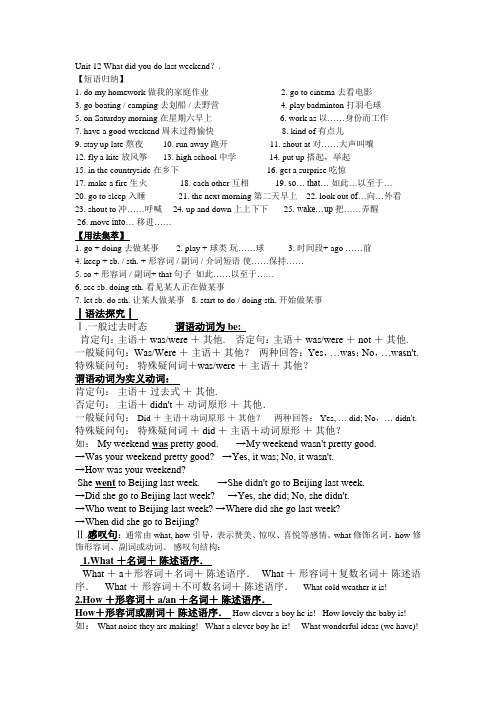
Unit 12 What did you do last weekend?.【短语归纳】1. do my homework 做我的家庭作业2. go to cinema 去看电影3. go boating / camping 去划船 / 去野营4. play badminton 打羽毛球5. on Saturday morning 在星期六早上6. work as 以……身份而工作7. have a good weekend 周末过得愉快8. kind of 有点儿9. stay up late 熬夜 10. run away 跑开11. shout at 对……大声叫嚷12. fly a kite 放风筝13. high school 中学14. put up 搭起,举起15. in the countryside 在乡下16. get a surprise 吃惊17. make a fire 生火18. each other 互相19. so…that…如此…以至于…20. go to sleep 入睡21. the next morning 第二天早上22. look out of…向…外看23. shout to 冲……呼喊 24. up and down 上上下下25. wake…up把……弄醒26. move into…移进……【用法集萃】1. go + doing 去做某事2. play + 球类玩……球3. 时间段+ ago ……前4. keep + sb. / sth. + 形容词 / 副词 / 介词短语使……保持……5. so + 形容词 / 副词+ that 句子如此……以至于……6. see sb. doing sth. 看见某人正在做某事7. let sb. do sth. 让某人做某事 8. start to do / doing sth. 开始做某事┃语法探究┃Ⅰ.一般过去时态谓语动词为be:肯定句:主语+ was/were +其他. 否定句:主语+ was/were + not +其他. 一般疑问句: Was/Were +主语+其他?两种回答: Yes,…was;No,…wasn't.特殊疑问句:特殊疑问词+was/were +主语+其他?谓语动词为实义动词:肯定句:主语+过去式+其他.否定句:主语+ didn't +动词原形+其他.一般疑问句:Did +主语+动词原形+其他?两种回答: Yes, … did; No,… didn't. 特殊疑问句:特殊疑问词+ did +主语+动词原形+其他?如: My weekend was pretty good. →My weekend wasn't pretty good.→Was your weekend pretty good? →Yes, it was; No, it wasn't.→How was your weekend?She went to Beijing last week. →She didn't go to Beijing last week.→Did she go to Beijing last week? →Yes, she did; No, she didn't.→Who went to Beijing last week? →Where did she go last week?→When did she go to Beijing?Ⅱ.感叹句:通常由what, how引导,表示赞美、惊叹、喜悦等感情。
初中英语人教版七年级下册Unit 12 知识点(重点单词+短语+句子精讲)

七年级英语下册Unit 12知识点【重点单词】camp v.扎营;扎帐篷lake n.湖,湖泊beach n.海滩,沙滩badminton n.羽毛球运动sheep n.羊,绵羊as adv.&pron.作为,当做natural pron.自然的butterfly n.蝴蝶visitor n.游客;访问者tired adj.疲倦的stay v.停留stay up late深夜不留away adv.离开run away 跑开mouse n.老鼠baby n.幼小的shout v.呼叫,喊叫shout at…冲……大声叫嚷woof v.(狗叫声)汪汪language n.语言fiy v.飞kite n.风筝fiy a kite 放风筝high adj.&adv高的(地)high school中学ago adv.以前India n.印度tent n.帐篷put up 搭起,举起moon n.月亮surprise n.&v.惊奇,惊讶get a surpris 吃惊snake n.蛇scared adj.惊慌的move v.移动shout to…对……大声喊叫start v.开始,着手jump v.跳跃up and down 上上下下wake v.弄醒,醒into prep.到……里面forest n.森林ear n.耳朵【重点短语】st weekend 上周末2.do one’s homework 做作业3.go to the cinema 看电影4.go boating 去划船5.camp by the lake 在湖边露营6.go to the beach 去海滩7.play badminton 打羽毛球8.on Saturday morning 在周六的早上9.study for the English test 为了英语考试学习10.feed some cows 喂一些奶牛11.work as a guide 做为一个导游工作12.Natural History Museum 自然历史博物馆13.butterfly house 蝴蝶馆14.over 200 kinds of butterflies 超过200多种蝴蝶15.tell sb about …告诉某人关于…16.living habits 生活习惯17.be kind of tired 有点儿累19.stay up 熬夜20.play with sb.和某人玩21.lose things 丢东西22.run away 跑开23.fly a kite 放风筝24.as a special gift 作为一个特殊的礼物25.take sb.to sp.把某人带到某地26.go camping 去露营27.put up the tents 搭建帐篷28.make a fire 生火29.keep sb.warm 使某人保持温暖30.on the first night 在第一天晚上31.so...that...如此…以至于…32.go to sleep 去睡觉33.get a surprise 吃惊34.see sb.doing sth.看见某人正在做某事35.jump up and down 上蹦下跳36.climb onto one’s back 爬到某人背上37.shout at/shout to 大声喊叫38 wake …up 把...弄醒39.move into…移入,爬进…中40.a useful lesson 有用的一课【重点句型】1.—What did you do last weekend?Lucy?Lucy,你上周末做了什么?—Well, on Saturday, I played badminton.噢.周六我打羽毛球了。
2023年新版新目标英语七年级下册unit12知识点总结

Unit12 What did you do last weekend?Section A1.camp(1)vi 宿营;露营;扎营go camping 去野营camp out 野营露营(2)n.野营;帐篷;营地summer camp 夏令营winter camp 冬令营2.by(1)by+地点名词表方位,在…旁边by the lake/river/tree/window/door by the side of the path.在路边注:表从…旁通过,多与动词go/walk/pass等连用。
(2)by+时间名词到…时(已发生某事),谓语多用完毕时;最晚、不迟于…,在…之前by now/then/this time/next Friday/the end of/three o`clock等。
By the end of last year,another new gymnasium had been completed到去年年终,又有一座新体育馆峻工了。
(3)by+名词表措施、方式、手段等。
A. by+the+可数旳时间、长度、重量等名词。
按…计算,按…买(卖)by the pound/ton/yard/meter/dozen/bale/day/month等。
B. by+表达时间、长度、重量等总称旳不可数名词(名词前不加冠词)。
按…计算,按…买(卖)by time/volume/length/weight/height/depth/width/area等。
C. by+交通工具、交通方式名词(名词前不加冠词,不变复数)。
通过…,由…,乘…by train/rail/tube/taxi/bus/truck/bike/boat/plane;by land/road/sea/water/air等。
(on foot)D. by+抽象名词或具有抽象意义旳一般名词(名词前不加冠词,不变复数)靠…,通过…,由…所致by skill/determination/practice/diligence/inference/chance/accident;by mail/letter/radio/fax/telephone/telegraph/hand/machine等。
七年级下册英语unit12笔记

七年级下册英语unit12笔记Unit 12: Healthy Living (健康的生活)I. Vocabulary (词汇)1. Diet and Exercise (饮食和运动)- balanced diet (平衡饮食):Eating a variety of foods from different food groups in appropriate portions to ensure getting all the necessary nutrients.- junk food (垃圾食品):Unhealthy food that is high in calories but low in nutritional value.- calorie (卡路里):A unit of energy measurement used to quantify the energy content of food.- aerobic exercise (有氧运动):Physical activity that increases the heart rate and improves cardiovascular fitness, such as running or cycling.- strength training (力量训练):Exercises that target muscle groups to increase strength and tone, such as weightlifting or push-ups.2. Health and Wellness (健康和养生)- stress (压力):Mental or emotional strain caused by difficult or demanding circumstances.- relaxation (放松):The state of being free from tension and stress.- sleep deprivation (睡眠不足):The condition of not getting enough sleep, which can lead to various health problems.- hygiene (卫生):Practices that promote cleanliness and prevent the spread of diseases, such as washing hands and brushing teeth.- immunity (免疫力):The ability of the body to resist and fight infections and diseases.II. Grammar (语法)1. Modal verbs (情态动词)- can (能够):Used to express ability or possibility.- e.g., I can swim.- should (应该):Used to give advice or make suggestions.- e.g., You should eat more fruits and vegetables.- must (必须):Used to express obligation or necessity.- e.g., You must drink plenty of water.2. Present Continuous Tense (现在进行时)- Used to describe actions happening at the current moment.- Structure: subject + am/is/are + verb + ing.- e.g., She is running in the park now.III. Reading Comprehension (阅读理解)1. Benefits of Exercise (运动的好处)Regular exercise has numerous benefits for both your physical and mental health. It helps maintain a healthy weight, reduces the risk of chronic diseases, and strengthens your muscles and bones. Exercise also improves mood, relieves stress, and promotes better sleep. Therefore, it is essential to incorporate regular physical activity into your daily routine.2. Importance of a Balanced Diet (平衡饮食的重要性)A balanced diet is crucial for maintaining good health. It provides the necessary nutrients, vitamins, and minerals that your body needs to function properly. Eating a variety of foods from different food groups ensures that you get a balance of carbohydrates, proteins, fats, vitamins, and minerals. Avoiding junk food and sugary drinks is also important to prevent weight gain and reduce the risk of diseases such as diabetes and heart disease.IV. Writing Practice (写作练习)Topic: My Healthy Living Plan (我的健康生活计划)我正在制定一个健康的生活计划,以改善我的身体和心理健康。
(必考题)初中英语七年级下册Unit 12知识点总结(答案解析)
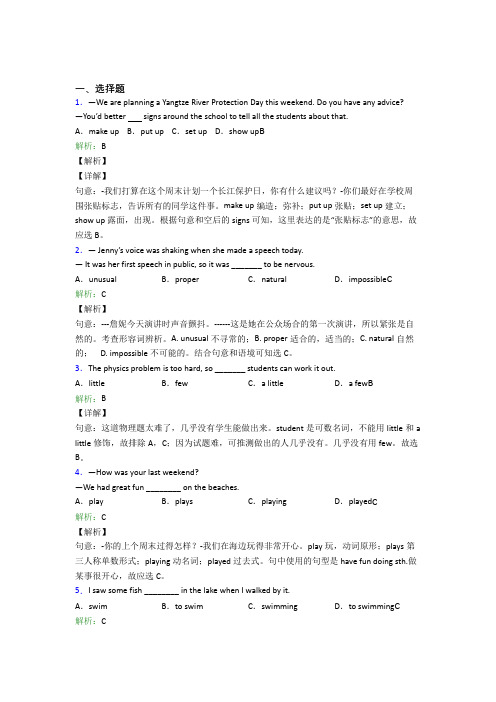
一、选择题1.—We are planning a Yangtze River Protection Day this weekend. Do you have any advice?—You’d better signs around the school to tell all the students about that.A.make up B.put up C.set up D.show up B解析:B【解析】【详解】句意:-我们打算在这个周末计划一个长江保护日,你有什么建议吗?-你们最好在学校周围张贴标志,告诉所有的同学这件事。
make up编造;弥补;put up张贴;set up建立;show up露面,出现。
根据句意和空后的signs可知,这里表达的是“张贴标志”的意思,故应选B。
2.—Jenny’s voice was shaking when she made a speech today.— It was her first speech in public, so it was _______ to be nervous.A.unusual B.proper C.natural D.impossible C解析:C【解析】句意:---詹妮今天演讲时声音颤抖。
------这是她在公众场合的第一次演讲,所以紧张是自然的。
考查形容词辨析。
A. unusual不寻常的;B. proper适合的,适当的;C. natural自然的; D. impossible不可能的。
结合句意和语境可知选C。
3.The physics problem is too hard, so _______ students can work it out.A.little B.few C.a little D.a few B解析:B【详解】句意:这道物理题太难了,几乎没有学生能做出来。
student是可数名词,不能用little和a little修饰,故排除A,C;因为试题难,可推测做出的人几乎没有。
人教版七年级下册英语 Unit 12 基础知识单词、短语、句子默写版

Unit 12 What did you do lastweekend?A部分重点单词★根据汉语提示默写出下列单词1.扎营;搭帐篷v.2.海滩;沙滩n.3.羊;绵羊n.4.自然的adj.5.游客;访问者n.6.停留;待v.7.老鼠;耗子n.8.呼叫;喊叫v.9.湖;湖泊n.10.羽毛球运动n.11.作为;当作prep. 12.蝴蝶n.13.疲倦的;疲劳的adj.14.离开;远离adv.15.幼小的adj. 婴儿n.16.语言n.★写出下列单词变形1.beach⎼______________(复数)2.butterfly⎼______________(复数)3.baby⎼______________(复数)4.tell⎼______________(过去式)5.two⎼______________(序数词)6.sheep⎼______________(复数)7.mouse⎼______________(复数)8.visit⎼______________(名词)游客9.lose⎼______________(过去式)重点短词★根据汉语提示默写出下列短语1.深夜不睡;熬夜2.冲……大声3.去划船4.某人的生活习惯5.作为一名导游6.告诉某人关于……7.度过一个愉快的周末8.跑开9.上周末10.湖畔扎营11.喂羊12.蝴蝶馆13.和某人一起去14.打羽毛球重点句子★根据汉语提示默写出下列句子1.—上个周末你做什么了?—我做我的家庭作业了。
2.—你好,Lisa, 周末过得怎么样?—好极了,谢谢。
3.—你周末过得愉快吗?—是的,愉快,但我现在有点累,我熬夜看足球赛了。
4.—她和谁一起去的?—她和她的同班同学一起去的。
5.我在自然历史博物馆当了一名导游。
6.它们(博物馆)有一座房子,里面有200多种蝴蝶!7.谁拜访她的祖母了?8.“所以嘛,儿子,那就是学会一门外语很重要的原因,”鼠爸爸回答道。
B部分重点单词★根据汉语提示默写出下列单词1.飞v.2.风筝n. 3.高的(地) adj.&adv.4.以前adv.5.蛇n.6.移动v.7.跳; 跃v.8.到……里面;进入prep.9.耳朵n.10.印度n.11.帐篷n.12.月亮n.13.惊奇;惊讶n. 使吃惊v.14.惊慌的; 吓坏了的adj.15.开始;着手v.16.弄醒;醒v.17.森林n.★写出下列单词变形1.scare⎼______________(形容词)2.up⎼______________(反义词)3.read⎼______________(过去式)4.wake⎼______________(过去式)5.start⎼______________(同义词)6.use⎼______________(形容词)7.fly⎼______________(过去式)8.sit⎼______________(过去式)重点短词★根据汉语提示默写出下列短语1.放风筝2.搭起;举起3.吃惊4.上上下下;起伏5.一件特殊的礼物6.搭起;举起7.在第一个夜晚8.入睡,睡着9.读关于…的书10.开始做某事11.搬进12.有趣的事情13.高中毕业14.打扫房间15.在周六晚上16.待在家里17.脱口秀18.中学19.互相;彼此20.对……大声喊叫21.把……弄醒22.乘长途车去23.使某人暖和24.讲故事25.朝外看26.知道关于27.跳上跳下28.生火29.觉得……正在做某事30.看见……正在做某事31.如此……以至于……32.和某人一起吃晚饭33.度过一个繁忙的周末34.为……学习重点句子★根据汉语提示默写出下列句子1.我的姐姐两周前高中毕业了。
人教版七年级下册英语Unit 12 知识点语法归纳总结
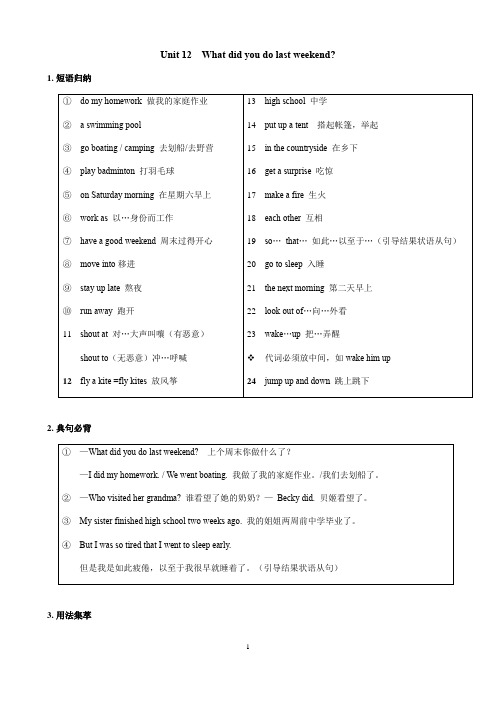
Unit 12 What did you do last weekend?1.短语归纳2.典句必背3.用法集萃(1)What did you do last weekend? 你上周末做了什么?❖last 作形容词时,意为“最后的,最末的”或者“紧接前面的,刚过去的”。
例如:Today is the last day in the year. 今天是今年的最后一天。
I didn’t sleep well last night. 昨晚我没睡好。
❖last作副词时,意为“最后地”,例如:I’m the last one. 我是最后一个。
❖last 做动词时,意思是“持续,继续,维持”等,例如:The hot weather lasted a week. 炎热的天气持续了一周。
(2)How interesting! 多有趣啊!❖本句是how引导的感叹句,how用来修饰形容词或副词,此类感叹句的结构为:“How+形容词/副词( +主语+谓语)!”。
例:How beautiful the girl is! 这个女孩真漂亮啊!How fast the boy is running ! 那个男孩跑得真快啊!❖what也可以引导感叹句,what用来修饰名词。
常见的结构有:(3)I stayed up late to watch the soccer game. 我熬夜到很晚看了足球赛。
❖stay up是固定搭配,意为“熬夜”。
例:She stayed up until 2 :00 am. 她熬夜熬到凌晨两点。
❖常见的“动词+up”结构的短语还有:(4)The cat quickly ran away. 那只猫飞快地逃跑了。
❖run away意为“逃跑;跑开”,其中run意为“跑”,过去式是ran,属于不规则变化。
例:The thief tried to run away, but he failed. 那个小偷试图逃跑,但失败了。
- 1、下载文档前请自行甄别文档内容的完整性,平台不提供额外的编辑、内容补充、找答案等附加服务。
- 2、"仅部分预览"的文档,不可在线预览部分如存在完整性等问题,可反馈申请退款(可完整预览的文档不适用该条件!)。
- 3、如文档侵犯您的权益,请联系客服反馈,我们会尽快为您处理(人工客服工作时间:9:00-18:30)。
Unit12 What did you do last weekend?
◆短语归纳
1. do my homework 做我的家庭作业
2. go to cinema 去看电影
3. go boating / camping 去划船 / 去野营
4. play badminton 打羽毛球
5. on Saturday morning 在星期六早上
6. work as 以……身份而工作
7. have a good weekend 周末过得愉快
8. kind of 有点儿
9. stay up late 熬夜
10. run away 跑开
11. shout at 对……大声叫嚷
12. fly a kite 放风筝
13. high school 中学
14. put up 搭起,举起
15. in the countryside 在乡下
16. get a surprise 吃惊
17. make a fire 生火
18. each other 互相
19. so…that…如此……以至于……
20. go to sleep 入睡
21. the next morning 第二天早上
22. look out of…向……外看
23. shout to 冲……呼喊
24. up and down 上上下下
25. wake…up 把……弄醒
26. move into…移进……
27. a swimming pool 一个游泳池
◆用法集萃
1. go + doing 去做某事
2. play + 球类玩……球
3. 时间段+ ago ……前
4. keep + sb. / sth. + 形容词 / 副词 / 介词短语使……保持……
5. so + 形容词 / 副词+ that 句子如此……以至于……
6. see sb. doing sth. 看见某人正在做某事
7. let sb. do sth. 让某人做某事
8. start to do / doing sth. 开始做某事
◆典句必背
1. —What did you do last weekend? 上个周末你做什么了?
—I did my homework. / We went boating. 我做了我的家庭作业。
/我们去划船了。
2. —Who visited her grandma? 谁看望了她的奶奶?
—Becky did. 贝姬看望了。
3. My sister finished high school two weeks ago. 我的姐姐两周前中学毕业了。
4. But I was so tired that I went to sleep early. 但是我是如此疲倦,以至于我很早就睡着了。
◆话题写作
主题:介绍过去发生的一件事情
My friend Li Hua came to visit me on May Day. During the following days I showed him around the city.
We went to the Guangzhou Museum on the morning of May 2. We learned much about the history
of Guangzhou. In the afternoon., we climbed the Baiyun Hills. It was really great fun! In the evening. I took Li Hua to the night zoo. It was interesting to see animals at night. The next day, we went to the bookshops to buy books.
Though we were very tired, we enjoyed ourselves very much.。
